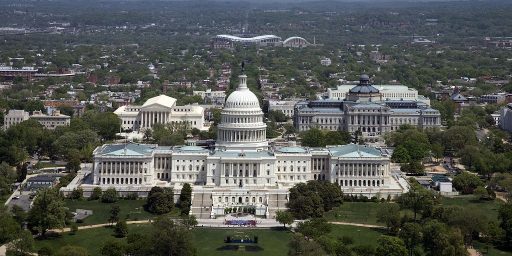Repeal Amendment’s Practical Application
If 33 states can muster support to kill a law, how would it have gotten enacted to begin with?
My colleagues, Doug Mataconis and Steven Taylor, have written several good pieces discussing the theoretical implications of the Repeal Amendment being proposed by the Republican leadership.
Under the overwrought title “Incoming House Majority Leader Endorses Plan To Destroy Constitution,” Doug traces the origins of the idea, discusses the history of Nullification during the pre-Civil War period, and argues this amendment
would alter the relationship between the states and the Federal Government in a way that even the Founders themselves never contemplated. For example, even though it has long been the rallying cry of the so-called “state’s rights” crowd, there is absolutely no support for the argument that the Constitution contains any power allowing the states to nullify a Federal law they deem to be unconstitutional. In fact, James Madison himself rejected the very idea during the controversy over the Alien and Sedition Acts, which occurred only a few years after he had participated in the drafting of the Constitution. Granting the states the power to overturn a Federal law, whether for policy or Constitutional reasons, would do more to bring down the Federal structure of the American government than even the Civil War tried to do.
In a followup, “Further Thoughts On The Repeal Amendment,” he traces the move to consolidation of power in the Federal government owing to the Civil War, a series of Supreme Court decisions, amendments to the Constitution, and the tendency of people to move from state to state for economic reasons. The upshot is the creation of a polity that the founders wouldn’t recognize and a cultural shift such that most of us think of ourselves as Americans first and only secondarily — if at all — residents of a particular state.
Finally, in “A Question About Representation,” Steven invites a discussion as to the degree in which the interests of a state are separable from the interests of the people living in said state.
But there’s a more practical point that I’m having trouble understanding. Here’s the Amendment in a nutshell, as described by Dana Milbank:
It would allow the repeal of any federal law – from civil rights to health care – if two-thirds of the states say so. But that could mean that the 33 smallest states, which have 33 percent of the population, have the power to overrule the 17 largest states, which have 67 percent of the population.
The theoretical issue doesn’t bother me overmuch, in that the states currently have equal representation in the Senate. But here’s the thing: If 33 states can muster support to kill a law, how would it have gotten enacted to begin with? It’s much easier to kill the bill in the Senate, where a mere 40 percent can veto most any legislation. (There’s the Reconciliation workaround, which can be theoretically applied to anything that the parliamentarian allows to be called budget related, but even there 50 percent can stop its passage.) So, what good would it do?
One could envision a bill being signed into law and becoming wildly unpopular at some later point in time, whether through cultural change or unintended consequences manifesting themselves. But, again, if two-thirds of the state legislatures can get together and nullify a law, one would think Congress would be falling all over themselves to change it and get credit. Again, it’s the Senate that’s the usual stumbling block to things but it’s difficult to imagine 3/5 of the Senators filibustering legislation that 2/3 of the states want overturned.






“If 33 states can muster support to kill a law, how would it have gotten enacted to begin with?”
Well, special interests buying legislation comes to mind. Why do they give so much to congressional and senatorial campaigns in the first place? Civic mindedness? I think not.
This amendment falls squarely into the “phony outrage” category. The republicans are just band-wagoning onto the anti-federal tea party movement. When it comes down to reality, the GOP will do NOTHING to reduce federal power. Their goal is to control federal, state, and local policy, so a reduction in federal power is anti-thetical to that end.
Good point. Anyone want to bet this never even occurred to Cantor? I’ve got ten bucks on it…
@James:
Indeed: this is one of the points I am getting at in my post. There is an assumption by those who find the Repeal Amendment appealing that somehow the interests of the states as represented by state legislatures would be radically different from the interests of the states as represented by the Senators in the Senate.
This strikes me as problematic and assumes some bizarre Interest of the State that is different from the interests of citizens.
But, as you note, if the citizens of a given state really hate a particular legislature proposal, surely that would be reflected in the vote of their Senator. And would still be reflected in the in the State’s Interest in regards to a Repeal Amendment scenario.
@Steven
Agreed. I have the same questions about the “Repeal the 17th Amendment” claptrap. I’ve yet to fathom why I’d rather have my Senator elected by some yokels who I have no say over and whom most of the people voting for have no idea who they are rather than just picking him out myself.
I wrote almost two years ago that the 17th Amendment should be repealed. The 17th mandated election of senators by the people rather than by legislatures, which was the Founders’ intention.
If senators were directly beholden to state legislatures, as they were until 1913, then we’d have no need of the new amendment you discuss here. The bad laws would never make it out of the Senate to begin with.
@Donald Sensing
What evidence is there that the state legislatures have the interests of the state in mind any more than the people of the state? At least people know who their US Senator is. Most have no clue who represents them in the state legislature.
I’ve yet to fathom why I’d rather have my Senator elected by some yokels who I have no say over and whom most of the people voting for have no idea who they are rather than just picking him out myself.
I don’t really care either way. I don’t have a whole lot of faith in the legislatures to get it right, but then I don’t have a whole lot of faith in the voters to get it right, either. I kind of like on the state level how we are able to elect different positions that in the federal government are appointed, but I don’t think much is gained by being able to do so except by better-positioning future governors.
If you really want to use the Senate to push power back to the states, having the legislature do so is not a particularly good way to go about it unless you also create recall power within the legislatures or the governor.
James, the reason is that today there is no check and balance between the legislatures and Congressional enactments, especially when it comes to budgetary impacts upon states. Senators can enact to give free candy to voters knowing that the fact that the law will put 70 percent of the budget impact on the states will mean nothing come reelection time. It won’t come on the voters’ radar. This is has been going on in all sorts of public-assistance programs for decades, as you know.
If a senator’s continued employment is at risk by running afoul of state legislators, who actually have to pay for so much of Washington’s whim to work, then I believe we’ll see much more restraint in D.C. Also, a senator having to defend his positions to other politicians, who live every day immersed in policy details, will not be able to BS them the way he can BS the voters.
While we’re at it, I’ve in mind a whole list of amendments we should enact.
If a senator’s continued employment is at risk by running afoul of state legislators, who actually have to pay for so much of Washington’s whim to work, then I believe we’ll see much more restraint in D.C. Also, a senator having to defend his positions to other politicians, who live every day immersed in policy details, will not be able to BS them the way he can BS the voters.
The problem is that it’s only at risk every 6 years and if the legislature flips, they’re likely to be ousted anyway. For it to have the effect you refer to, states would have to have the ability to recall senators who don’t look out for their interest.
Sounds like some people just don’t care much for federalism if you think about it.
@Charles Austin – well, I’d certainly fit in that category.
The problem with your assumption is that the elected officials will be doing what >50% of their constituents want. This ignores the reality of primaries, where the candidate must first win over >50% of their own party’s voters.
In this case, it’s not hard to imagine a senator from a red (or blue) state voting for a bill that has 51% support among Republicans (or Democrats), even if it has only 30% support among the entire population of the state.
Now even if that senator’s state legislature was split 2/1 for their own party, it might still have a majority who are against the senator’s federal vote.